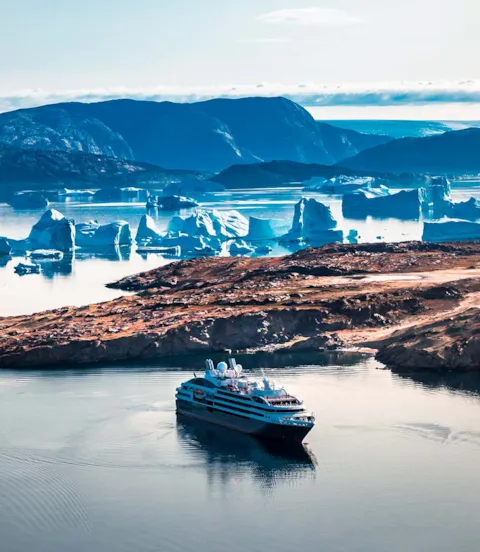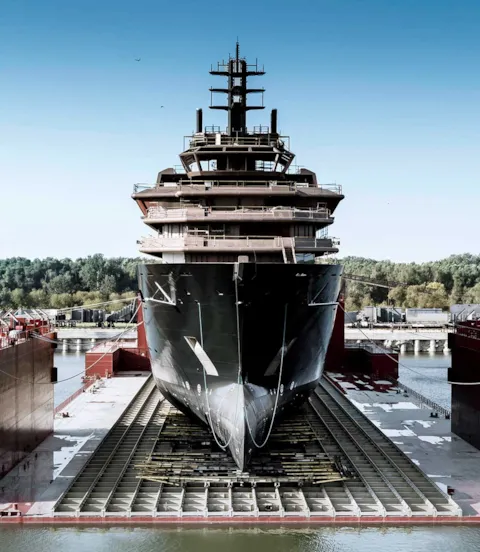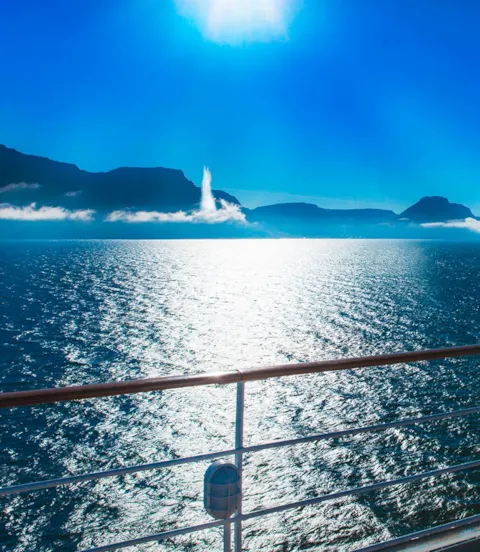Merging yachting, luxury cruise and scientific expedition
Ultra luxury expedition yachts are a relatively new trend in cruise shipping. New ships of this type are entering the market in rapid succession. They must prove that they protect what they are exploring.
The cruise industry has undergone a remarkable development in recent years. With passenger numbers continuing to climb, operators are seeking to differentiate their ships and routes, catering to selected interests and customer groups. Luxury expedition yachts utilize advanced technology to create a unique and exclusive travelling experience.

Expedition vessels on the rise
V.Ships Leisure, the cruise division of the ship management company V.Group, has recognized the trend and won several high-profile contracts to manage and/or support new yachts in the ultra-luxury cruise segment, among them the Ritz-Carlton Yacht Collection. Furthermore, V.Ships Leisure will be in charge of technical management of the world’s largest research and expedition yacht, the DNV GL-classed REV Ocean, which is scheduled to begin operations in 2021.
According to Per Bjornsen, Director Marine Operations at V.Ships Leisure, a record number of around twelve new expedition vessels entered service in 2019 alone. “We continue to see an increasing number of new players enter the market who bring with them a wealth of new ideas and a diverse range of offerings,” he says. “This ship type merges three different segments: cruise, scientific exploration and the luxury yacht experience.
They complement each other very well, unlocking unique advantages and bringing new opportunities to each segment.”

Ecological ambitions
The cruise industry has come under public scrutiny because of its alleged environmental impact. While the public has been slow to acknowledge the coming into force of the IMO’s sulphur cap in 2020, there has been mounting pressure on the segment to reduce its ecological footprint. Expedition cruises in particular are being suspected of damaging the pristine environments in the remote sea regions that are their preferred destinations.
But quite apart from public opinion, there has been a trend among private super and mega yacht owners to focus on sustainability when building new ships, and the same trend can be observed in the cruise industry. “In tandem with the global shift towards lower carbon fuels across the entire maritime industry, we’re currently seeing a growing interest in greener fuels among owners and operators,” confirms Bjornsen. “This includes the use of biofuels and electric-hybrid propulsion.”
While the maritime industry is committed to reducing carbon emissions across its global fleet, it must look at the whole picture, both inside and outside the industry, to find suitable ways of designing and building ships for a better, more sustainable future, says Bjornsen. “We have made it our goal at V.Group to go beyond helping our customers to meet regulations. We want to lead the fight for cleaner shipping.”

Low-impact research vessel
The REV Ocean project is a good example: “The yacht will be equipped for conducting research that covers the entire marine ecosystem, using advanced technology developed by world-leading knowledge clusters in Norway. REV Ocean will be used by scientists for innovative research expeditions to explore issues such as the impact of CO2 emissions on the oceans, plastic pollution, protection of endangered species, and sustainable fishing,” describes Per Bjornsen.
The vessel will feature a hybrid power system including diesel-electric engines with SILENT-R notation to reduce underwater noise emissions, and an additional 3 MW lithium-ion battery pack for peak shaving, ensuring optimum efficiency. “This ship represents the cutting edge in green ship technology,” says Bjornsen.
“In addition, REV Ocean will benefit from the expertise of our well-connected Norwegian office, which already has strong ties with Kjell Inge Røkke, the originator of the not-for-profit foundation REV Ocean and its research vessel project, and extensive knowledge of working within the guidelines set out by the Norwegian Maritime Authority.” The ship will also use V.Ships’ digital ship management platform ShipSure.
“This ship represents the cutting edge in green ship technology.”

Class drives technology adoption
DNV GL plays a leading role in promoting and supporting sustainability, Bjornsen points out, adding that cyber security and digitalization are two other challenges the leisure shipping industry must address, supported by class. “Our industry has to step up its efforts in this respect and embrace new technologies as quickly as possible.
We must be aware that there isn’t that one big solution that solves all problems. For example, lowering emissions isn’t just one step but many small steps. We have to start somewhere using the available solutions, such as battery-powered tender boats. Another option is to use battery power when entering a port; the ship can then recharge while at berth, and leave port on battery power again, later switching to low-pollution LNG.” Lowering ship emissions to zero will still take a long time, Bjornsen contends, but there is a lot the industry can do now. “We cannot wait until someone invents the perfect solution,” he emphasizes.
Bjornsen sees class taking the lead in handling many of the new challenges connected with sustainability, cyber security and digitalization. DNV GL’s activities regarding technology qualification – making sure new technologies are fit for purpose – are key to their adoption and safe use on board ships, he says. It would be disastrous for any ship operator, let alone a luxury cruise company, their brand and the industry segment as a whole to see a technology fail that was supposed to make shipping safer or more sustainable.
By establishing class rules for areas such as emission abatement, polar cruising and cyber security, and by vetting new technology before it is deployed, classification societies help ship operators and managers mitigate specific risks, providing them with a methodical approach for using these technologies, and reassuring them of their systems’ resilience. This must be accompanied by proper crew training programmes and strict adherence to well-designed procedures to raise awareness of potential threats and risks while helping to avoid them.

Polar Code requires training and sea time
With the global fleet of cruise ships and yachts growing, manning becomes a challenge, especially for expeditions into polar waters, Bjornsen explains: “The industry may soon face a shortage of senior deck officers with Polar Code certification and experience with ice navigation. The mandatory Polar Code certification requires both training and sea time.” V.Group operates the largest network of owned recruitment centres across the world, which make sure deck officers have proper qualifications. Basic Polar Code training can be provided to them through interactive e-learning in preparation for the advanced part, which has to be taken at a training institute and at sea.
Digitalization, says Bjornsen, can not only be used for training, but also to provide technical management with the means to improve monitoring and maintenance. Furthermore, remote surveys relying on digital technology can ease the burden of the inspection regime, a crucial factor in cruise shipping. There is no doubt, he stresses, that all of these factors play an increasingly prominent role in the interaction between class, the ship manager, the owner and the operator, with new, powerful digital tools opening up a vast array of potential benefits for all stakeholders, and ultimately, the guests, the environment and science.

- Side image 1: Tetyana Dotsenko – Shutterstock.com
- Text image 1: ©The Ritz-Carlton Yacht Collection
- Side image 2: REV Ocean/©Guillaume-Plisson
- Text image 2: REV Ocean/©Guillaume-Plisson

